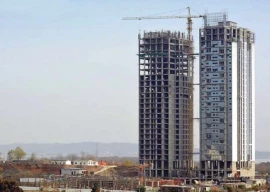The filling stations have had their day, or 35 to be exact. The Islamabad High Court on Friday dismissed their petitions against a government notification on three-days-a-week gas outage at CNG stations.
Justice Riaz Ahmad Khan had issued a stay order to the filling stations on November 18, ensuring that they get uninterrupted supply of gas.
Sui Northern Gas Pipeline (SNGPL) moved the court soon after, asking for a clarification. The owners had submitted two petitions in the court: one against the three-day closure and the other against a possible two-month closure. The company argued that the stay was applicable to the two-month possible closure, which was notified on August 18 and forewarned a possible seven to 14 days of continuous suspension of gas supply to CNG stations.
Petroleum ministry has its say
Petroleum ministry counsel Mirza Mehmood said that the nature of the CNG sector is different from other gas consuming sectors like fertiliser, which uses gas during the production of a product that is necessary for agriculture. But the CNG sector caters to motorists who have alternatives in the form of petrol and diesel.
His second argument was that at the time of awarding licenses for CNG stations, SNGPL receives No Objection Certificates from the owners, under which they agree to follow the gas supplier’s load management plan. CNG owners were intimated prior to the loadshedding that they will not be provided even a single cubic foot of gas from December to February, but nevertheless, they are being provided gas, he said.
Mirza informed the court that 4.2 billion cubic feet (BCF) gas is being produced in the country, whereas the overall demand has reached 8 BCF. The policy is to meet the demands of the “most needy” sectors first, he added.
He said industries were deprived of 38% of their gas needs, whereas the CNG sector was deprived of only 13%. Gas consumption by the CNG sector is also gradually increasing, whereas the consumption of other sectors is decreasing, he added.
He said that after the stay order, the consumption of gas at CNG stations “doubled” because all public transporters get gas from Islamabad on days when loadshedding is enforced in Rawalpindi.
The other side
Former Attorney General of Pakistan Makhdoom Ali Khan, who was representing CNG filing station owners, informed the court that ministry of petroleum and SNGPL had offered them a solution that all CNG owner shut down their filling stations for two days a week and for three hours daily at different timings, which they found unacceptable.
“If Khyber-Pakhtunkhwa is exempted from gas loadshedding because it produces gas (provisioned under Article 158 of the Constitution) then Islamabad should also be exempted, as under the 18th Amendment it is a co-owner of the gas reservoirs of all the provinces,” he argued.
Justice Riaz’s remarks
Accepting SNGPL’s plea, Justice Riaz made it clear to both parties that he did not stay the three-days-a-week gas suspension notification, but only restrained SNGPL from disconnecting gas supply to CNG stations.
CNG owner’s reaction
Agha Sikander, a CNG station owner in Islamabad said, “We respect the courts, but gas supply will continue until we receive the written order.”
Another CNG station owner, Noorul Amin, said, “We will call a meeting of our core committee and will decide the future legal course of action.”
He added, “We also have the option to go on strike against the decision if the core committee approves.”
Domestic users hopeful
The official SNGPL position behind low gas pressure in many sectors in Islamabad was the continuous supply of gas to CNG filling stations. People appreciated the court’s verdict, saying that they might finally get acceptable gas pressure at home.
Published in The Express Tribune, December 24th, 2011.
COMMENTS (1)
Comments are moderated and generally will be posted if they are on-topic and not abusive.
For more information, please see our Comments FAQ
1725030039-0/Untitled-design-(2)1725030039-0-405x300.webp)





1614423942-7/-ET-Burns-Road-by-Athar-Khan-(8)1614423942-7-270x192.webp)










The poor domestic gas consumer is very important. Efficient gas utilisation, and waste of gas on geysers, and domestic generators on natural gas. Penalties be imposed by violators of domestic gas. Solar geysers are made locally and cost almost the same as gas geysers. Solar geysers should be free from all taxes. Next are dependence of industrial units producing goods including, power companies, IPP's, fertiliser units, and all industries purchasing premium price for the gas provisioning subsidy low rates for the domestic consumers. Auto industry should use Electric Vehicle which can be charged with solar and can be independtly produced in Pakistan without any international collaboration to overcome todays crisis.